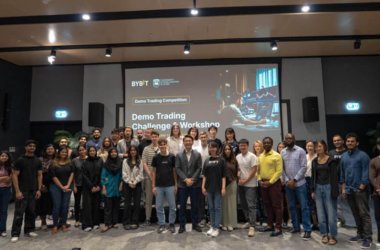Deputy Editor Giorgia Guantario spoke to Dr Maryam Al Yammahi, Assistant Professor in Computer science, UAE University to discuss the digital skills gap and how the university is hoping to solve it.
In today’s increasing data-driven economy, one of the biggest challenges organisations face is the growing digital skills gaps. As emerging technologies, the like of Artificial Intelligence, Internet of Things and robotics happen in shorter cycles, organisations struggle to recruit, onboard and train their employees, which could prove fatal as more and more disruptors enter the market.
According to the World Economic Forum, at least 133 million new roles generated as a result of the new division of labour between humans, machines and algorithms may emerge globally by 2022 – this situation is only intensified by the advent of the Fourth Industrial Revolution.
The responsibility for bridging this digital gap is spread across a number of entities – organisations, governments and educational entities are all part of the solution.
The UAE has been making great strides to solve this issue, with government and universities coming together to create a talented set of graduates who will be able to use their skills to bring growing value as new employees. The UAE University is among those who are driving innovation to solve this growing challenge, but according to Dr Maryam Al Yammahi, Assistant Professor in Computer science, the real solution is connecting organisations to academic institutions to get ready for Industry 4.0.
“One of the main issues is the lack of communication between organisations and universities. Too often fresh graduates haven’t had the chance to weigh themselves against the organisation’s skill requirements,” explained Dr Al Yammahi.

The Assistant Professor also believes universities could play a big role in helping organisations reskill their workforce, something that will be necessary for 54 percent of all current employees by 2022, according to the World Economic Forum.
“Right now we are concentrating and working on preparing students only, but in the long run, we’d like to have the possibility to help organisations train their employees to make sure they are up to date with new technologies. As a university, we hope to share our knowledge beyond our institution.
“I think connecting universities with R&D teams within organisations will also prove beneficial to all parties involved. The Fourth Industrial Revolution will affect all sectors, but each will need its own set of development and use cases to strive and leverage new technologies. Universities can help take this a little further,” she continued.
The UAE University has been adopting innovative education practices and has been pushing for more collaboration between industries and students.
Artificial Intelligence has become one of the main areas the University has been focusing on, as the technology has been at the centre of many governments and private sector’s strategies in the past couple of years.
Dr Al Yammahi said, “Part of the UAEU’s initiatives to prepare skilled employees of the future has been centred around the creation of Learning Smart Factory – labs that encourage students to develop AI technology and smart applications technology that can be leveraged in the Fourth Industrial Revolution to establish a ‘smart factory’.
The UAE University, ranked first in the UAE according to the Times Higher Education Rankings 2020, also offers a minor in AI, as well as graduate programs in other emerging technologies such as data and machine learnings. Dr Al Yammahi explained that students can expect to learn through a hands-on approach how to improve the UAE government agencies and industry performance with these technologies.
“At UAEU, we also hold a series of workshops to have student gain a practical understanding of the technology, may this be AI or related to different software. Moreover, we strongly support our students’ ideas – we try to connect students with organisations from the moment they develop an idea that could increase productivity or solve a challenge, up to the prototyping stage, carefully pairing each solution to the right industry application.
“As I have mentioned before, I strongly believe that the answer to solving the digital gap is developing open communication between universities, governments and organisations, and at UAEU we have been doing just that,” explained Dr Al Yammahi.
2020 will be an exciting year for the University, as they will be participating to the much-awaited Expo 2020 Dubai through the exhibition ‘The University of the Future’ and ‘the Pathfinder Program’. Dr Al Yammahi concluded by expressing her excitement for this initiative which will showcase UAEU’s vision to pioneer a new role of education and to transform unemployment challenges into innovative solutions.





